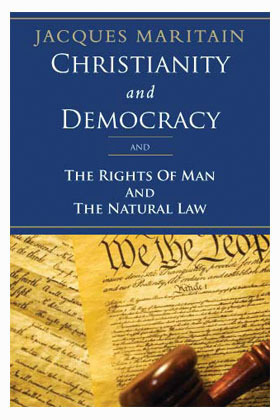Jacques Maritain on "Four Characteristics of a Society of Free Men"
The following excerpt is from the section, "Four Characteristics of a Society of Free Men", from Jacques Maritain's Christianity and Democracy: The Rights of Man and The Natural Law (Ignatius Press, 1986, 2011):
We see that the conception of society which I have just outlined may be characterized by the following features: it is personalist because it considers society to be a whole composed of persons whose dignity is anterior to society and who, however indigent they may be, contain within their very being a root of independence and aspire to ever greater degrees of independence until they achieve that perfect spiritual liberty which no human society has within its gift.
degrees of independence until they achieve that perfect spiritual liberty which no human society has within its gift.
This conception is, in the second place, communal because it recognizes the fact that the person tends naturally toward society and communion, in particular toward the political community, and because, in the specifically political sphere and to the extent that man is a part of political society, it considers the common good superior to that of individuals.
In the third place this conception is pluralist because it assumes that the development of the human person normally requires a plurality of autonomous communities which have their own rights, liberties and authority; among these communities there are some of a rank inferior to the political state, which arise either from the fundamental exigencies of nature (as in the case of the family community) or else from the will of persons freely coming together to form diverse groups. Other communities are of a rank superior to the State, as is, above all, the Church in the mind of Christians, and as would also be, in the temporal realm, that organized international community toward which we aspire today.
Finally the conception of society we are describing is theist or Christian, not in the sense that it would require every member of society to believe in God and to be Christian, but in the sense that it recognizes that in the reality of things, God, principle and end of the human person and prime source of natural law, is by the same token the prime source of political society and authority among men; and in the sense that it recognizes that the currents of liberty and fraternity released by the Gospel, the virtues of justice and friendship sanctioned by it, the practical respect for the human person proclaimed by it, the feeling of responsibility before God required by it, as much from him who exercises the authority as from him who is subject to it, are the internal energy which civilization needs to achieve its fulfillment.
As for those who do not believe in God or who do not profess Christianity, if they do, however, believe in the dignity of the human person, in justice, in liberty, in neighborly love, they also can cooperate in the realization of such a conception of society and cooperate in the common good, even though they cannot trace their practical convictions to basic principles, or even though they seek to base these convictions on defective principles. In this conception civil society is organically linked to religion and turns consciously toward the source of its being by invoking divine assistance and the divine name as its members know it. Independent in its own temporal sphere, it has above it the kingdom of things that are not Caesar's, and it must cooperate with religion, not by any kind of theocracy or clericalism, nor by exercising any sort of pressure in religious matters, but by respecting and facilitating, on the basis of the rights and liberties of each of us, the spiritual activity of the Church and of the diverse religious families which are grouped within the temporal community.
The book is also available as as electronic book download.
Carl E. Olson's Blog
- Carl E. Olson's profile
- 20 followers



